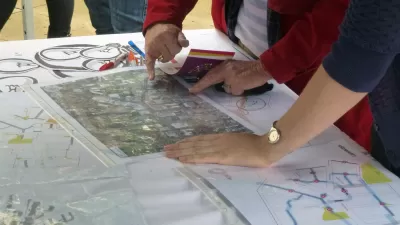Two years ago the Planetizen editors asked me to contribute a monthly blog posting. The first one appeared in February 2007 and I have managed to submit posts monthly for two years. In accepting the assignment, I decided that I needed to have an angle. I write, teach, and practice about the substance of planning so I decided to do something else—provide advice for students on how to enter and succeed in planning programs. Martin Krieger at USC already provided a terrific advice column for doctoral students so I decided to focus on students in professional planning programs.
Two years ago the Planetizen editors asked me to contribute
a monthly blog posting. The first one appeared in February 2007 and I have
managed to submit posts
monthly for two years. In accepting the assignment, I decided that I needed to
have an angle. I write, teach, and practice about the substance of planning so
I decided to do something else-provide advice for students on how to enter and
succeed in planning programs. Martin Krieger at USC already provided a terrific
advice column for doctoral students so I
decided to focus on students in professional planning programs.
The following paragraphs list many of my earlier posts clustering
them into themes. Topics include:
- Getting into graduate school
in planning: how to find the right program, apply, and
decide
which offer to take up. - Undertaking the exit
project or thesis. Topics include the what, why, and when of choosing an exit option,
getting
started, troubleshooting
common problems, managing your committee, and actually
finishing. - Making the most of being a student
and learning when (not) to email experts. - Finding online resources to
increase your planning knowledge including: images, articles, organizations,
faculty
blogs, books,
more books
and movies. - Developing skills for
planning including: writing, managing time, doing a literature review, and
creating a portfolio.
I'll continue my
advice column next week with advice on picking a first job.

Alabama: Trump Terminates Settlements for Black Communities Harmed By Raw Sewage
Trump deemed the landmark civil rights agreement “illegal DEI and environmental justice policy.”

Planetizen Federal Action Tracker
A weekly monitor of how Trump’s orders and actions are impacting planners and planning in America.

The 120 Year Old Tiny Home Villages That Sheltered San Francisco’s Earthquake Refugees
More than a century ago, San Francisco mobilized to house thousands of residents displaced by the 1906 earthquake. Could their strategy offer a model for the present?

Ken Jennings Launches Transit Web Series
The Jeopardy champ wants you to ride public transit.

BLM To Rescind Public Lands Rule
The change will downgrade conservation, once again putting federal land at risk for mining and other extractive uses.

Indy Neighborhood Group Builds Temporary Multi-Use Path
Community members, aided in part by funding from the city, repurposed a vehicle lane to create a protected bike and pedestrian path for the summer season.
Urban Design for Planners 1: Software Tools
This six-course series explores essential urban design concepts using open source software and equips planners with the tools they need to participate fully in the urban design process.
Planning for Universal Design
Learn the tools for implementing Universal Design in planning regulations.
Clanton & Associates, Inc.
Jessamine County Fiscal Court
Institute for Housing and Urban Development Studies (IHS)
City of Grandview
Harvard GSD Executive Education
Toledo-Lucas County Plan Commissions
Salt Lake City
NYU Wagner Graduate School of Public Service





























